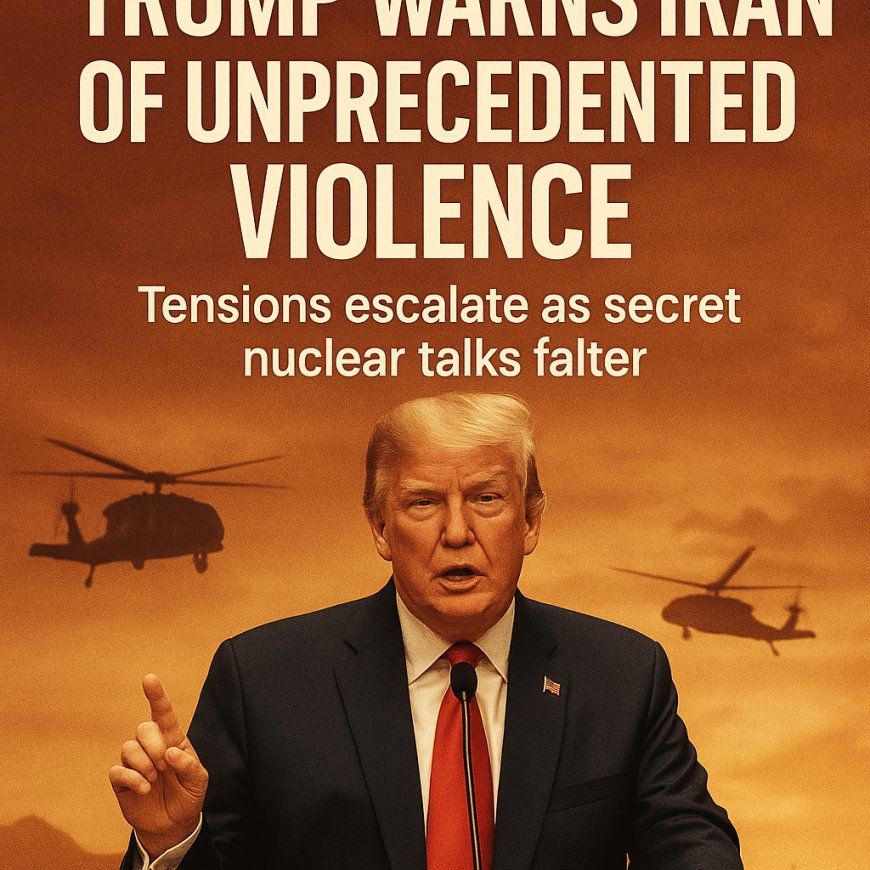Donald Trump’s Direct Threat to Iran Shakes the Global Arena
Former U.S. President Donald Trump issues a severe military threat to Iran if it refuses a new nuclear deal, escalating fears of conflict amid secret negotiations in Oman.

An Ominous Message from Abu Dhabi
In a development that has sent shockwaves through international diplomatic circles, former U.S. President Donald Trump delivered a stern warning to the Iranian regime during a high-profile security summit in Abu Dhabi. Trump’s message was unambiguous: if Tehran refuses to adhere to a newly proposed nuclear agreement under his conditions, it will face a military retaliation described as "violence never before seen in modern history." The statement immediately captured the world’s attention, triggering heightened fears of a potential military conflict in the already volatile Middle East.
Details of Trump’s Statement
Speaking to a room filled with regional leaders, defense ministers, and international observers, Trump accused Iran of persistently advancing its nuclear ambitions while destabilizing the region by arming and supporting proxy militias. He claimed that the United States, in coordination with its allies, possesses detailed operational plans that could be executed "within hours" should the Iranian leadership defy Western demands.
"Unprecedented Violence" — A Bold Threat
Trump’s rhetoric was especially incendiary as he described the nature of a potential military response. He characterized the scale of planned operations as unprecedented in modern warfare, hinting at targeted strikes on strategic Iranian military and nuclear facilities. This threat is particularly alarming given the ongoing secret negotiations between U.S. and Iranian diplomats in Oman — talks that had shown tentative progress before this new escalation.
The Strategic Importance of Oman’s Secret Talks
Multiple diplomatic sources confirm that clandestine discussions between Washington and Tehran were underway in Oman, a nation historically known for its neutral mediation role in Middle Eastern conflicts. The talks aimed to revive aspects of the 2015 Joint Comprehensive Plan of Action (JCPOA), albeit under stricter stipulations proposed by Trump’s camp. Analysts fear that Trump’s aggressive comments could derail these fragile negotiations, undoing months of quiet diplomacy.
Iran’s Immediate Response
In the hours following Trump’s statement, Iran’s Foreign Ministry issued a swift rebuttal, condemning the remarks as "reckless warmongering." A spokesperson reiterated that Iran reserves the right to defend itself against any aggression and would respond decisively to any act of military hostility. Iranian state media emphasized that while the nation is open to equitable diplomatic solutions, it will not submit to threats or ultimatums.
Regional Reactions and Implications
Persian Gulf Nations
Key Gulf nations like the United Arab Emirates and Saudi Arabia cautiously welcomed Trump’s tough stance on Iran’s nuclear activities but urged restraint to avoid an all-out regional war. Both nations remain concerned about Iran’s influence in Iraq, Syria, Lebanon, and Yemen, where proxy conflicts persist.
European Union
The European Union expressed deep alarm over Trump’s remarks, advocating for continued diplomatic engagement and warning against actions that could escalate military tensions in the region. EU foreign policy chief Josep Borrell emphasized the importance of the ongoing talks in Oman and called for restraint on all sides.
Israel’s Position
Israel, a longstanding critic of Iran’s nuclear ambitions, voiced strong support for Trump’s uncompromising message. Prime Minister Benjamin Netanyahu declared that the Iranian regime poses an existential threat to global peace and stability and endorsed preemptive action if necessary.
What Are the Risks of Military Escalation?
The prospect of military conflict between the United States and Iran carries severe geopolitical risks. Experts warn that such a confrontation could:
- Disrupt global oil markets, with prices soaring due to threats to maritime shipping lanes in the Strait of Hormuz.
- Spark retaliatory attacks by Iranian-backed militias against U.S. and allied forces in Iraq, Syria, and the Persian Gulf.
- Destabilize neighboring countries like Lebanon and Yemen, worsening humanitarian crises.
- Trigger cyber warfare targeting critical infrastructure in the U.S. and allied nations.
Historical Context: Trump, Iran, and the Nuclear Deal
Trump’s adversarial relationship with Iran dates back to his presidency, during which he withdrew the United States from the 2015 JCPOA, calling it "the worst deal ever." His administration implemented a "maximum pressure" campaign involving severe economic sanctions aimed at crippling Iran’s economy and forcing concessions on its nuclear and ballistic missile programs.
Military Capabilities and Preparedness
Defense analysts point out that while the U.S. military possesses overwhelming technological and strategic superiority, Iran’s asymmetric warfare capabilities, including its extensive missile arsenal and network of proxy militias, could inflict significant regional disruption. U.S. Central Command (CENTCOM) has reportedly increased its readiness levels in response to the heightened tensions.
International Appeals for Calm
The United Nations Secretary-General Antonio Guterres called for restraint, emphasizing the importance of dialogue over confrontation. He urged all parties to de-escalate tensions and prioritize the safety of civilians in the region. China and Russia, both signatories of the original JCPOA, also criticized Trump’s aggressive posture, reaffirming their commitment to a diplomatic resolution.
The Future of U.S.-Iran Relations
The latest episode underscores the volatile nature of U.S.-Iran relations and the complex web of regional alliances and rivalries. With presidential elections looming in both countries, the stakes are higher than ever. Experts argue that while Trump’s hardline approach might rally hawkish constituencies, it risks igniting a conflict with far-reaching global consequences.
A Region on the Brink
Donald Trump’s fiery warning to Iran has intensified an already precarious situation in the Middle East. As secret negotiations in Oman teeter on the brink of collapse and military assets on both sides remain on high alert, the world watches with growing anxiety. Whether this standoff culminates in diplomatic breakthrough or open conflict remains uncertain, but the implications of either outcome will reshape regional and global geopolitics for years to come.
Stay tuned for continuous updates on this developing story.
What's Your Reaction?
 Like
0
Like
0
 Dislike
0
Dislike
0
 Love
0
Love
0
 Funny
0
Funny
0
 Angry
0
Angry
0
 Sad
0
Sad
0
 Wow
0
Wow
0

































